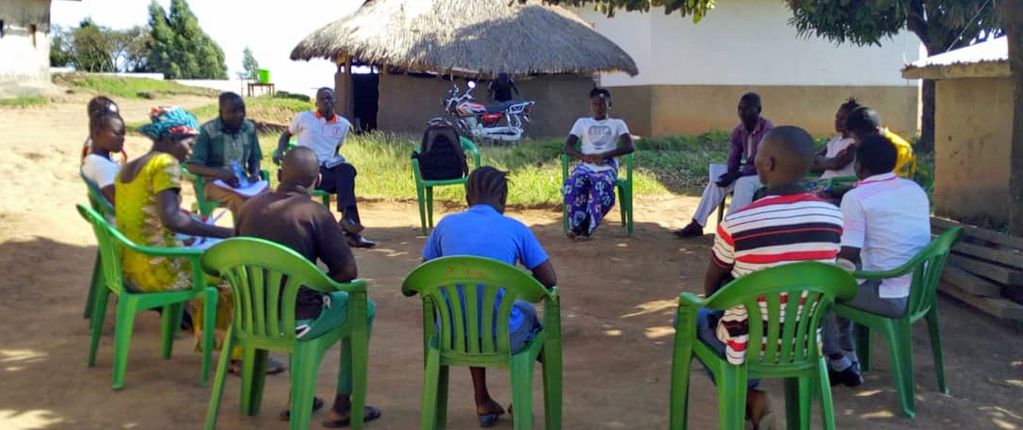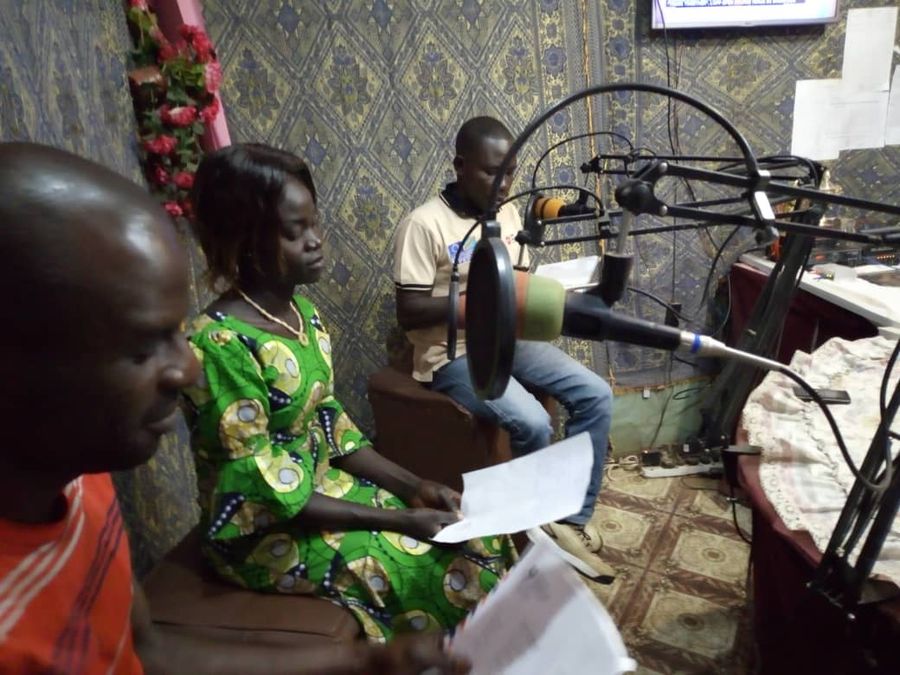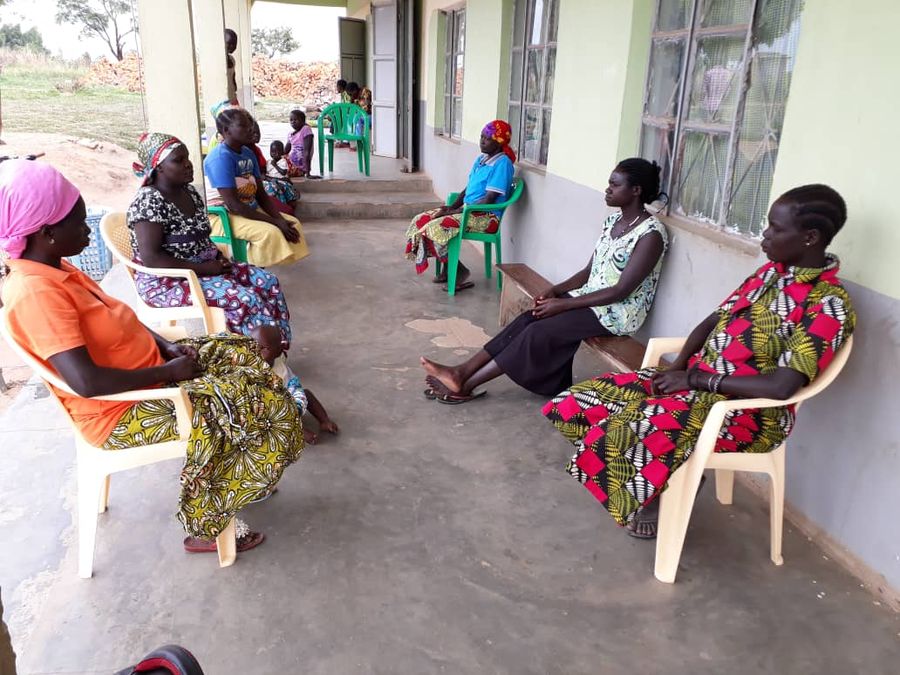
DR Congo: People First Impact Method (P-FIM) in Ebola and Covid-19 Response
During the recent Ebola epidemic in Eastern DRC which started in August 2018, our team in DRC employed a people-centred approach in responding to increasing mistrust and spread of rumours about the Ebola epidemic. Now, in order to address the current Covid-19 outbreak in the country and to reduce the harmful impact of the pandemic, Malteser International is putting people at the centre of its response, using the P-FIM approach.
The People First Impact Method (P-FIM)
The People First Impact Method (P-FIM) puts the people at the centre of the response, giving the community a voice. The aim is to understand the perception and values of a community, as well as the solutions its members are already implementing to address existing challenges. A P-FIM session consists of around 15 participants from the community, a facilitator supported by a reporter and an observer. While the reporter is mainly responsible to record statements of the community, the observer mainly focuses on the atmosphere in the group and registers, which level of communication the discussion reached. Both, reporter and observer can support the facilitator in the discussion. The first step is to create an environment of trust by engaging members of the community in a goal-free discussion. This relationship of trust enables a two-way communication between humanitarian actors and the affected communities. When this depth of communication is reached, community members openly share their feelings and emotions. As part of the two-way discussion, we identify and employ existing resources and capacities within the community, while members formulate for themselves what they need as additional support.
Video: Empowering engagement: How listening puts people first | Get to know P-FIM community communication
Experience from the Ebola Response
The outbreak of an epidemic and especially the application of prevention measures such as social distancing and isolation can generate mistrust within the community. Moreover, pre-tailored messages often fail to link directly to the perception of the community and common beliefs of disease transmission/origin, and thus often fail to show effect. For instance, the promotion of handwashing, is unlikely to be adopted by the community, if misbehaviour is commonly believed to be the cause of the disease.

Lessons learnt from the Ebola epidemic in DRC showed that a response that is created without the population risks to be rejected by the community, triggering rumours and mistrust. This led to violence against healthcare workers and facilities, and thus hampering the Ebola response. Moreover, the spread of rumours in Ariwara, composed a security threat against Malteser International as an organization. The People First Impact Method (P-FIM) required that our team in DRC actively listen to the community in multiple goal-free and two-way discussions. The DRC team conducted P-FIM sessions with a total of over 4,000 participants. It is only through the use of this approach, that we understood people’s perception of the Ebola epidemic, existing rumours and their proposed solutions. Based on the results of these consultations, sensitization messages were elaborated closely with the community and we engaged them in the communication and dissemination of those messages. In addition, weekly interactive radio shows were conducted with participants from the P-FIM activities. The short sensitization messages and an Ebola sensitization song were broadcasted several times per day.
P-FIM during the Covid-19 response
Experiences gained during the Ebola response can now be applied to the most recent outbreak of Covid-19. We use the P-FIM method to understand the context and environment the community currently lives in, facing the Covid-19 outbreak, and how they understand the pandemic and preventive measures, to ultimately create the response together with the community.
Our approach

Having implemented P-FIM in the past, several Malteser International staff members were conversant with the method. Since mid-March 2020, our team in DRC has been conducting P-FIM activities in three health zones in the Ituri Province (Ariwara, Mahagi and Aru) with a population of 89,559. 871 people participated in 89 P-FIM sessions. Many different population groups and associations were involved in order to gather multiple and diverse perceptions. These groups included women associations, school children, youth groups, associations of people with disabilities, religious groups, local authorities, Congolese Business Association (CBA), farmers, car/motorbike cleaners, hairdressers, tailors, logging associations, etc.
In order to comply with Covid-19 prevention measures to ensure social distancing, P-FIM sessions are held with only 5 to 10 people at a time. Subsequent two-way discussions with community representatives are conducted via phone. Individual participants of the P-FIM sessions contact us in order to receive additional information or to share their feedback and new arising challenges, while we frequently reach out to participants to follow up on sensibilisation activities. However, in DR Congo, the low phone coverage remains a challenge.
Findings: How the community experiences the Covid-19 pandemic
The P-FIM activities have revealed that communities understand the threat of the Covid-19 pandemic and the necessity of preventive measures. However, many in the community are traumatised by recurrent epidemics. Measures such as social distancing and closure of public places (churches, schools) and borders have had a massive impact on people’s life. Many people have lost their sources of income (cross-border markets and trading, bars, restaurants, etc.), prices have increased dramatically and access to products of basic need have become difficult. To cope with the challenges, people are increasingly investing in field work and raising livestock, while striving to reduce unnecessary expenditures. The closure of churches and religious places has affected people who turn to spirituality or religion as a coping mechanism. Many members of the community are also worried about uncontrolled border crossing by truck drivers from mining companies as well as the impact of the massive population displacement, in relation to the Djugu conflict (Ituri Province) in Eastern DRC.
Community-led response to the Covid-19 pandemic
As part of P-FIM activities, community members formulated messages to be used in public awareness campaigns. Together, we developed necessary methods of dissemination.
Door-to-door sensibilization: Following the P-FIM sessions, the participants actively spread agreed upon prevention messages by doing door-to-door sensibilization activities.
Radio messaging: We organized interactive radio programs (so far 3 radio in Ariwara, Mahagi and Aru), in which participants shared their understanding of Covid-19 and the measures to fight this pandemic. These radio shows are recorded and aired weekly by the radio stations. In addition, the messages designed during the P-FIM sessions, were disseminated in the form of radio spots two times per day, in 9 languages (French, Lingala, Swahili, Kakwa, Kaliko, Lugbara, Ndo, Alur and Logo) and by two radio stations. Similarly, as a part of a wider community awareness program, the Covid-19 song is broadcast twice a day, by nine radio stations. The radio spots and programs have reached up to 1.2 million people.
Posters and leaflets: We have so far distributed 7,200 posters and leaflets with Covid-prevention messages; another 5,452 will be distributed in June and July 2020. The posters and leaflets include the awareness messages that were established during the P-FIM sessions and were further adapted to the official messages by the Ministry of Health. The participants of the P-FIM activities will be involved in the distribution of those materials.
Results and way forward
First results after P-FIM activities show that people are conscious about preventive measures and are adopting a beneficial behaviour. The community generally accept screening at entry points. A better understanding of the disease and prevention measures within the community so far helped to reduce the spread of rumours.
P-FIM enables to adapt the humanitarian response tailored to people’s need. The trust relationship gained through P-FIM sensitizes communities on the pandemic and prevention measures. However, not only to share one way, but to understand, how prevention measures can be better adapted to people’s context. Thus, we will continue to use P-FIM as an approach, in order to strengthen community engagement and ultimately improving social cohesion within the population.








